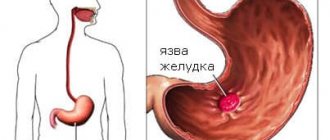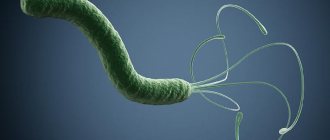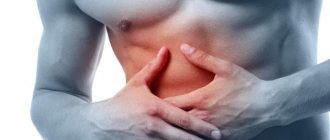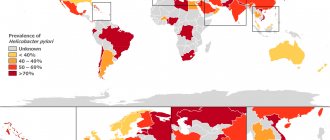A diet for diseases of the digestive tract caused by the bacteria Helicobacter pylori involves strict food restrictions and adherence to certain rules when creating a menu. Proper nutrition is an important element in the complex treatment of diseases of the gastrointestinal tract.
Importance of Dietary Nutrition
Helicobacter pylori is a pathogenic microorganism that develops on the mucous surface of the gastrointestinal system, causing various inflammatory and ulcerative processes. Active reproduction of the bacterium is possible only when favorable conditions are created - that is, by consuming foods that Helicobacter pylori “loves”.
With poor nutrition and frequent consumption of fatty foods, the microflora of the stomach and intestines is disrupted. Optimal conditions are created for the rapid spread of harmful microorganisms. A special diet allows you to maintain the balance of microflora and increase the protective forces of the digestive system, which destroy Helicobacter pylori.
Properly selected products stop further growth and reproduction of bacteria, inhibit inflammatory processes, but you can only get rid of them completely with the help of antibacterial drugs. The diet must be followed at all stages of treatment.
Discovery of Helicobacter pylori
The history of one of the greatest discoveries of the 20th century began in 1979, when ordinary doctor Barry Marshall received a position at the largest clinic in Western Australia - the Royal Perth Hospital. During one of the internal trainings organized by the clinic's management, Marshall met the talented pathologist Robin Warren. He was just studying the etiology of gastritis and managed to captivate his new friend. Already in 1981, the duo of Marshall and Warren discovered a spiral bacterium in the mucous membrane of patients with gastritis. It took researchers a year to develop a hypothesis linking the “newborn” Helicobacter pylori with strong ties to peptic ulcers and stomach cancer.
However, the road to success is rarely paved with roses and lilies. At first, the theory of Marshall and Warren met only grins from colleagues and skepticism from venerable scientists. In 1998, when the difficulties were over, Marshall wrote: “Everyone was against me then. But I knew I was right." Persistent Australians paved the way for their discovery, sparing neither time, nor strength, nor health.
After an unsuccessful attempt to infect piglets with Helicobacter pylori infection, Marshall decided on an experiment worthy of great researchers. He drank the contents of the Petri dish in which H. pylori was cultured and prepared to wait. The scientist hoped that in a year or a little more he would be diagnosed with a stomach ulcer, and he would finally prove an obvious cause-and-effect relationship. However, events were not long in coming.
Three days into the experiment, Marshall's mother noticed that her son's breath began to smell bad. Soon nausea and vomiting joined the symptoms, and just eight days after the desperate act, an endoscopic examination confirmed: acute gastritis had begun in the doctor’s stomach, and H. pylori was cultured from a smear of the mucous membrane. On the 14th day of the experiment, Marshall began taking antibiotics. After the course of treatment, complete recovery was recorded.
In 1985, details of the experiment appeared in the pages of the Medical Journal of Australia. By the way, this article soon gained worldwide fame and became the most cited in the entire history of the publication. It would seem that the evidence is obvious and the matter is small. However, full recognition was still almost a decade away.
Table 2.
Drugs for eradication therapy (international and trade names)
| Group | International name | Tradename |
| antibiotics penicillins | amoxicillin | Ospamox, Flemoxin Solutab, Hiconcil |
| macrolide antibiotics | clarithromycin | Labax, Klabax OD, Clarithromycin-Zentiva, Clarithromycin Pfizer, Klacid, Klacid SR, Fromilid, Fromilid Uno |
| antibiotics tetracyclines | tetracycline | Tetracycline |
| proton pump inhibitors | omeprazole | Zerotsid, Losek, Omez, Omizak, Ortanol, Romesek, Ulkozol, Ultop, Helitsid, Cisagast |
| lansoprazole | Lanzabel, Lanzap, Lanzoptol, Lancid, Loenzar-sanovel, Epicurus | |
| rabeprazole | Bereta, Zolispan, Zulbex, Noflux, Ontime, Pariet, Rabelok, Hayrabezol | |
| pantoprazole | Zipantola, Controloc, Crosacid, Nolpaza, Pantaz, Panum, Peptazol, Pigenum-sanovel, Puloref, Sanpraz, Ulthera | |
| esomeprazole | Nexium, Neo-Zext, Emanera | |
| antimicrobial and antiprotozoal agents | metronidazole | Klion, Metrogyl, Metronidazole, Trichopolum, Flagyl, Efloran |
| gastroprotectors | bismuth tripotassium dicitrate | De-Nol, Novobismol |
Authorized Products
There are foods and dishes that help to attenuate the growth and spread of Helicobacter pylori and reduce inflammatory processes during exacerbation of diseases of the digestive organs. List of permitted products:
- first courses in vegetable broths with pasta, potatoes and cereals;
- bakery products - the bacterium is “afraid” of yesterday’s wheat loaf, crackers;
- meat - beef, veal, rabbit, chicken and turkey;
- offal - liver, tongue, quail and chicken eggs;
- sausages - sausages, sausages no more than once a week during remission;
- fish - ocean and river fish of lean varieties;
- cereals - buckwheat, oatmeal, rice, semolina, pasta;
- dairy products - whole milk, cream, sour cream, kefir, ayran, butter, cottage cheese and hard cheese;
- vegetables - zucchini, cauliflower, carrots, kohlrabi, potatoes, broccoli, beets;
- fruits and berries - apples, peaches, nectarines, bananas, watermelons, melon, apricots, raspberries and strawberries;
- sweets - jam, jellies, jams, marshmallows, meringue, soufflé, dry cookies, honey.
Drinks that kill the bacterium Helicobacter pylori - black and green teas, still mineral water, berry and fruit compotes, fruit drinks, herbal decoctions.
Gastroenterologist: “The enemy of the stomach is not sour, but sweet”
The bacterium with the sonorous name Helicobacter pylori is a dangerous enemy of the human body. Most people on the planet are infected with it. The microorganism can be transmitted through kissing and causes gastritis, ulcers and stomach cancer.
Helicobacter is poorly treated with antibiotics, and there is no vaccine for it yet. News.
ru learned from the head of the department of therapy, gastroenterology, hematology and endoscopy of the Wiener Privatklinik Kamel Kopti about the diagnosis and treatment of Helicobacter pylori.
— Helicobacter pylori was discovered about 40 years ago, but medicine did not recognize the danger of this bacterium for a long time. They said that no microorganism can survive in stomach acid. How do bacteria manage to exist in such an environment?
— There is always a small amount of urea in the stomach. Helicobacter pylori breaks down urea to form ammonia.
Ammonia neutralizes the hydrochloric acid of the stomach and provides the bacteria with local maintenance of a pH that is comfortable for it. The resulting ammonia irritates the mucous membranes of the stomach and duodenum.
Inflammation begins, which provokes gastritis and ulcers. It has also been proven that Helicobacter pylori causes stomach and intestinal cancer and some types of lymphomas.
— A person is born without Helicobacter pylori, he becomes infected with it throughout his life. In what ways does transmission occur?
— You know, doctors for a long time did not understand why the bacterium is rarely found among Eskimos and Japanese. Then it turned out: in these cultures it is not customary to kiss. The bacterium is most often transmitted through kissing.
And not necessarily on the lips: on the cheek, and even through a kiss on the hand. Therefore, no one person in a family can be infected with Helicobacter. Usually both children and parents get sick. Another popular method of transmission is through shared dishes, towels, and cosmetics.
The bacterium can also be infected through airborne droplets.
— How do you know if you have become infected with a bacteria? How quickly does it manifest itself?
“You can live infected with a bacterium your whole life and not know it. Or you can become infected and after a couple of weeks feel the symptoms of gastritis: pain, heartburn, belching and others. It all depends on the aggressiveness of the bacteria. It becomes dangerous most often when immunity decreases.
Therefore, I always recommend starting treatment for gastritis caused by Helicobacter pylori with lifestyle adjustments. Immunity declines when a person eats poorly, does not get enough sleep, exposes himself to stress, or smokes. By the way, about stress. Remember that the stomach is directly related to your emotional background. All your experiences fall like a dead weight on him.
Drug therapy may not be effective if a person continues to live as before.
— Is it possible to completely remove bacteria from the body?
— Not all antimicrobial drugs can destroy it. The microorganism quickly develops resistance to antibiotics. In addition, it is easy to become infected with Helicobacter pylori again. With the help of medications, you can “remove” the aggressiveness of the bacteria and eliminate inflammation.
— Many people still believe that gastritis and ulcers are caused by eating sour and spicy foods. Do they affect the activity of bacteria?
- No. The enemy of the stomach is not sour, but sweet. Packaged juices, baked goods, and chocolate provoke the spread of Helicobacter pylori. It’s just that bacteria, like people, “love” sweets.
— In Russia, the so-called C-urease breath test is popular to determine the presence of bacteria and the level of its aggressiveness. How do you rate its effectiveness?
— I am convinced that the correct level of Helicobacter pylori can only be detected using endoscopy and biopsy. In our clinic, these are priority methods of examination.
Prohibited Products
When following a diet against Helicobacter pylori, you must strictly limit or completely exclude from your menu any fried, fatty, pickled, smoked and canned foods. They activate the growth and reproduction of pathogenic microorganisms, causing an exacerbation of pathologies.
Prohibited products:
- rich soups, borscht, beetroot soups in mushroom, meat or fish broth;
- bakery products - butter pastries, freshly baked wheat and rye bread;
- meat - fatty pork, ham, lamb, duck, goose;
- offal - animal fats;
- fish - fatty varieties, dried, smoked and salted fish;
- cereals - corn, pearl barley, millet and barley;
- dairy products - smoked, spicy, salted and processed cheese, margarine, spread;
- vegetables - white and red cabbage, cucumber, spinach, sorrel, peas, beans, green and onions, radishes, garlic, all varieties of mushrooms;
- fruits and berries - cherries, grapes, cherries;
- sweets - cakes, pastries and other confectionery products, ice cream, chocolate.
What drinks should not be consumed: strong black tea, coffee, cocoa, alcoholic and low-alcohol drinks, carbonated lemonades, store-bought juices.
Basic principles of nutrition
To create a treatment menu, it is not enough to know what foods Helicobacter pylori does not like. It is necessary to take into account the type of disease of the digestive system and the stage of the inflammatory process.
Be sure to take into account the level of gastric acidity, which can be increased or decreased.
The diet should consist of foods that kill Helicobacter pylori. The diet is followed until 11-12 months. In this case, the digestive system will need about 3-4 weeks to adapt to the new diet. Its main principles:
- It is recommended to eat at least 5-6 times a day;
- the weight of a serving should not exceed 280-300 g;
- the daily dosage of salt is reduced to 1 teaspoon;
- all dishes must be warm, too hot and cold dishes are prohibited;
- Fasting is not allowed;
- the diet must include dairy products that normalize the intestinal microflora;
- You need to drink up to 3 liters of liquid throughout the day.
All products must undergo heat treatment. They need to be boiled or cooked in a steam bath. At the stage of exacerbation of diseases of the digestive system, they can be further crushed using a blender.
Cooking rules
Proper nutrition is based on the consumption of foods that eliminate pathogenic microorganisms and fight the further progression of the inflammatory process. All dishes should be easily digestible, quickly digested and not place increased stress on the organs of the digestive system.
That is why all products that destroy Helicobacter pylori must be boiled, steamed, and then thoroughly ground in a blender during periods of exacerbation of diseases.
When preparing cutlets and meatballs, the minced meat should be passed through a meat grinder several times for a lighter, “airy” consistency. Fruits and vegetables should be chopped using a grater or cut into small cubes. During exacerbation of diseases, raw fruits, vegetables and berries are prohibited.
For cooking, it is best to replace sunflower oil with olive oil or a small piece of butter. The dosage of salt is reduced to 1 teaspoon per day; salt should be added at the very end of cooking.
Guarantees of effectiveness - in the hands of the pharmacist?
The effectiveness of eradication therapy has been calculated and sorted out. First-line therapy is successful in more than 75% of cases, and treatment using an alternative regimen (second line) brings recovery to 93% of patients. The unsatisfactory result of treatment is explained simply: bacteria quickly adapt to antibiotics and new, resistant strains appear. To defeat H. pylori, you must strictly follow the treatment regimen. And an undisciplined patient trying to replace, cancel or delay taking one or even several components of eradication therapy should be aware of the danger that awaits him.
A pharmacist and pharmacist can tell a doubting client how many additional problems may befall him when trying to “improve” the anti-ulcer complex in his own way. Don't skimp on colors when your customer wants to turn off the straight road to recovery towards traditional medicine or homeopathy. Paint a picture of resistant Helicobacter pylori infection brightly and on a grand scale, and another good deed will appear on your account.
Sample menu for combating Helicobacter pylori
The menu to combat Helicobacter pylori bacteria should be complete and varied, saturate the body with vitamins and other necessary substances.
| Day of the week | Breakfast | Dinner | Dinner |
| Monday | Oatmeal with water, egg white omelette | Broccoli and potato soup, boiled chicken fillet, stewed zucchini or zucchini | Baked fish fillet, mashed potatoes with boiled beets |
| Tuesday | Semolina pudding with jam | Carrot puree soup, steamed chicken ball with buckwheat, grated boiled carrots with olive oil dressing | Baked chicken breast or fish fillet with boiled potatoes, kefir |
| Wednesday | Cottage cheese with fruit or berry additives, yogurt | Carrot soup with wheat bread croutons, baked cauliflower, veal cutlet | Boiled turkey without skin with vegetable salad |
| Thursday | Boiled rice with milk and butter | Buckwheat soup, baked turkey breast with boiled or baked vegetables, chicory | Salad of boiled carrots, potatoes and beets with olive oil, a piece of hard cheese |
| Friday | Diet cottage cheese with fruit, tea with biscuits | Soup with oatmeal or barley and vegetables, pasta and chicken tenders | Baked pumpkin with wheat croutons and kefir |
| Saturday | Pasta and cottage cheese casserole, glass of kefir, ayran | Zucchini soup, skinless chicken breast, baked potatoes | Rice porridge with milk, a slice of hard cheese |
| Sunday | Buckwheat porridge with butter, veal meatballs | Puree soup from any vegetables, minced chicken or turkey meatballs with rice | Potato casserole with hard cheese |
The menu can be varied at your discretion, using products from the list of permitted ones. Important elements of a therapeutic diet are frequent and small meals, drinking plenty of fluids, proper cooking of foods and maintaining the required temperature of prepared foods.
Healthy snacks
The diet followed to combat the bacteria Helicobacter pylori involves frequent meals. It is recommended to eat at least 5-6 times a day. Therefore, in addition to main meals, you need to have several snacks throughout the day. For this purpose, you cannot use chips, nuts, chocolate, candies and other prohibited products.
Healthy diet snack options:
- dry biscuit-type cookies;
- apricot, carrot or pumpkin fresh;
- unsalted and unsweetened wheat bread crackers;
- yogurt, kefir, fermented baked milk, ayran;
- bananas, apples, nectarines, peaches;
- marshmallows, a small amount of honey;
- baked apples or pears.
It is very important to maintain the correct drinking regime. Throughout the day, it is recommended to drink at least 2.8-3 liters of liquid, including non-carbonated mineral water, a decoction of linden, chamomile or rose hips, a chicory coffee drink, weak black or green tea. Freshly squeezed juices without added sugar, fruit drinks, compotes, and jelly are also very useful.
Helicobacter pylori and alcohol
When treating diseases of the digestive system caused by the bacterium Helicobacter pylori, the consumption of any alcoholic or low-alcohol drinks is not recommended. They contribute to the exacerbation of stomach ulcers, gastritis, enterocolitis and other diseases, and accelerate the progression of inflammatory processes.
When ethyl alcohol penetrates the stomach, it destroys its mucous surface, has a pronounced irritant effect, and reduces the protective barrier of the gastrointestinal tract.
Strong drinks with an ethanol content of 40% cause the greatest harm to the digestive organs. This is vodka, whiskey, cognac. Regular consumption of such drinks leads to increased gastric acidity, which negatively affects digestive processes and provokes exacerbation of diseases.
It is especially important to avoid alcoholic beverages when treating Helicobacter pylori with antibiotics. This combination increases the likelihood of side effects from medications several times and causes severe intoxication of the body.
Bismuth preparations
Bismuth was one of the first drugs to eradicate H. pylori. There is evidence that bismuth has a direct bactericidal effect, although its minimum inhibitory concentration (MIC - the smallest amount of drug that inhibits the growth of a pathogen) against H. pylori is too high. Like other heavy metals such as zinc and nickel, bismuth compounds reduce the activity of the enzyme urease, which is involved in the life cycle of H. pylori. In addition, bismuth preparations have local antimicrobial activity, acting directly on the bacterial cell wall and disrupting its integrity.
Pros and cons of dietary nutrition
When treating diseases caused by Helicobacter pylori bacteria, the basic rules and principles of dietary table No. 1 are applied. This therapeutic diet has a number of advantages and disadvantages that must be taken into account before starting a course of treatment.
The main advantages of dietary nutrition:
- provides the body with vitamins, micro- and macroelements necessary for the normal functioning of all organs;
- is not accompanied by a feeling of hunger and can be prescribed for a long time (up to 12 months);
- accelerates the healing of ulcers on the gastric mucosa;
- reduces inflammation of gastric mucous tissues;
- relieves pain in the stomach area.
The diet to combat Helicobacter pylori also has several disadvantages. Long-term therapeutic nutrition is often difficult to maintain due to various holiday events, trips, business trips, and lunches in production conditions. In addition, preparing meals according to diet No. 1 will require sufficient culinary skills and a lot of time for boiling, baking or steaming foods.
Breath test
Breathing test - the patient breathes into special foil bags or extensors. Before the analysis, he drinks a drug labeled with a special isotope. Next, the reaction of the radioactive label is observed. By the amount of carbon isotopic composition in the exhaled air, comparing it with the sample before taking the isotope drug, doctors find out whether the bacterium Helicobacter pylori is present in the body. This is an informative and relatively cheap test. If the readings are negative, it is considered that the person does not have the bacteria, and no further research is carried out.
Brief summary
The therapeutic diet to combat Helicobacter pylori is based on avoiding foods that promote the rapid growth and reproduction of pathogenic microorganisms. The diet should be dominated by dishes and products that actively fight bacteria, reduce their activity and inhibit inflammatory processes.
A properly formulated diet is rich and varied. It allows you to restore the normal functioning of the digestive system, as well as prevent exacerbation of a chronic disease and reduce the risk of relapse.
Natural food supplements - proven mastic
Another suitable alternative to medications is proven natural nutritional supplements with sufficient concentrations of active ingredients. Natural remedies include oregano oil, licorice, and Chios mastic. It is mastic that is receiving more and more attention in recent medical research. Even in southern European countries, this natural remedy is gradually entering the scope of traditional treatment. Thousands of our compatriots have already had a positive experience of using mastic for difficulties caused by pathogens in the stomach.






